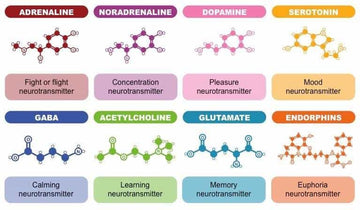Your mental wellness is regulated by a class of chemicals called neurotransmitters. And just like physical wellness, your mental wellness is equally important.
While it is common for everyone to go through ups and downs in life, if you have a constant feeling of stress, anxiety, depression, or feel an ongoing lack of motivation, there may be something else going on with your neurotransmitters.
How we feel is not only caused by outside stressors and factors but can also be because of an imbalance in the chemicals in our bodies. Stress hormones that remain raised due to ongoing work or relationship-related stress can lead to irritability, depression, anxiety, and insomnia for example.
The Role of Neurotransmitters in Mental Health
Neurotransmitters are chemical messengers that carry signals between neurons or nerve cells throughout the body. Millions of neurotransmitters are constantly at work transmitting messages from our brains to our bodies to help with tasks like breathing, moving and learning.
Neurotransmitters also affect how we feel, managing psychological functions such as fear, pleasure and changes in mood.

How Neurotransmitters are Classified
Neurotransmitters are classified according to their function. There are three main types of function:
- Excitatory – they cause an action
- Inhibitory – they inhibit a response or action
- Modulatory – they modulate and influence the effects of other chemical messengers
Neurotransmitters that are related to mental wellness include dopamine, GABA, serotonin, noradrenaline (norepinephrine), and glutamate.
GABA (gamma-aminobutyric acid) is an inhibitory neurotransmitter that plays a role in the regulation of anxiety.
Norepinephrine is an excitatory neurotransmitter that mobilizes the body and brain to take action in times of stress, activating the body's fight or flight response.
Dopamine is both an excitatory and an inhibitory neurotransmitter. It is known as the feel-good neurotransmitter. Certain drugs increase dopamine levels in the brain which makes them more addictive. Lower levels of dopamine may cause feelings of depression.
Serotonin is an inhibitory neurotransmitter and a hormone. It helps in the regulation of mood, sleep and anxiety. An imbalance in serotonin could affect your mood and lead to feelings of increased anxiety. People with depression are often found to have below-normal levels of serotonin
Glutamate is a common neurotransmitter that helps neurons fire up when appropriate. Problems with the production of glutamate in the body have been linked to mental wellness disorders such as depression.

Is your Mental Wellness Compromised?
n our modern, always on and busy world, it is easy to feel overwhelmed, anxious or fatigued. While we can't always control what happens in our lives, we can take control over our mental wellness by first assessing what is wrong and then taking the right steps to correct it.
Some of the symptoms and signs you may be suffering from a mental health disorder are:
- Low energy
- Difficulty sleeping
- Feeling irritable more often
- Loss of sex drive
- Loss of appetite
- Difficulty concentrating
- A constant feeling of dread
- Fatigue
- Poor concentration
- Weight gain
Those feelings of anxiety, panic, and depression could be the result of an imbalance in some neurotransmitters. The good news is that once you can identify which neurotransmitters are out of balance you can, with the help of your doctor, come up with a plan for rebalancing them, and your life. This can be through medications, a change in lifestyle, and/or diet.
At Home Testing for Imbalances in Neurotransmitters
Lab Me offers an at-home Advanced Neurotransmitter Test.
This test is ideal for helping you get to the root of any of the above symptoms or ongoing issues such as adrenal dysfunction, mood disorders, lack of ambition or libido, or any other psychological conditions. The test zeroes in on your personal chemistry which can then guide your health provider or doctor on the best and most targeted treatment approach.
This advanced neurotransmitter test includes a range of 14 neurotransmitters and metabolites, an essential collection of tests not available from any other lab.
Included in these tests are tests for levels of Serotonin, GABA, Glutamate, DOPAC, Pooled norepinephrine as well as diurnal norepinephrine.
Ways you Can Improve your Mental Wellness
- Keep track of your health through regular blood testing. Read more on the importance of tracking your blood here.
- Make space for a mindfulness practice like yoga or meditation
- Eat a more balanced diet
- Get enough exercise
- Get enough sleep
- Connect more with family and friends
- Decrease your alcohol intake
Test Your Neurotransmitters At-Home
The Lab Me at-home advanced neurotransmitter profile is ideal for assessing psychological conditions, helping get to the root of issues such as adrenal dysfunction, mood disorders, lack of ambition or libido, OCD and ADD/ADHD. This testing also helps zero in on an individual’s chemistry and guides providers to treatments that are targeted more precisely.
Click Here


